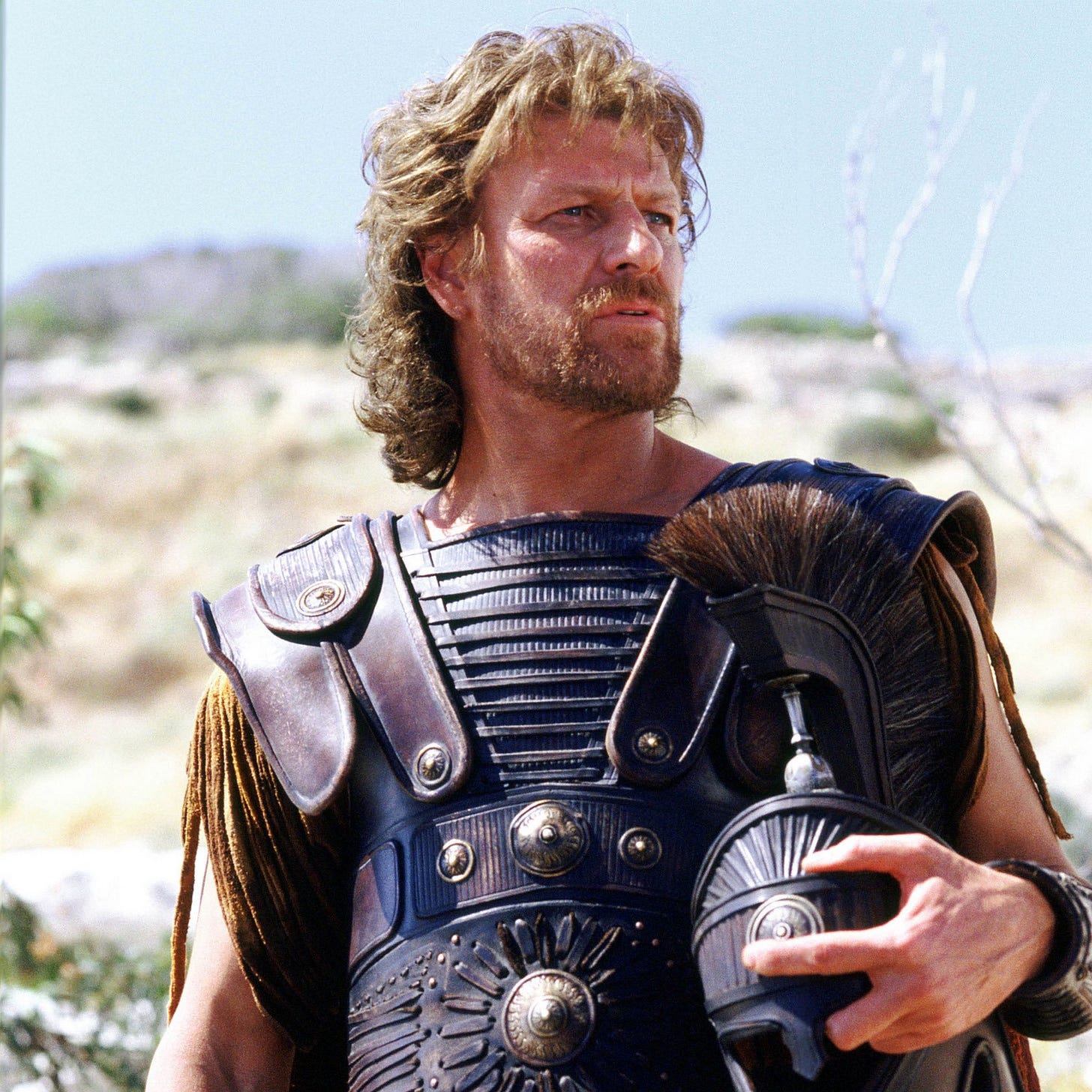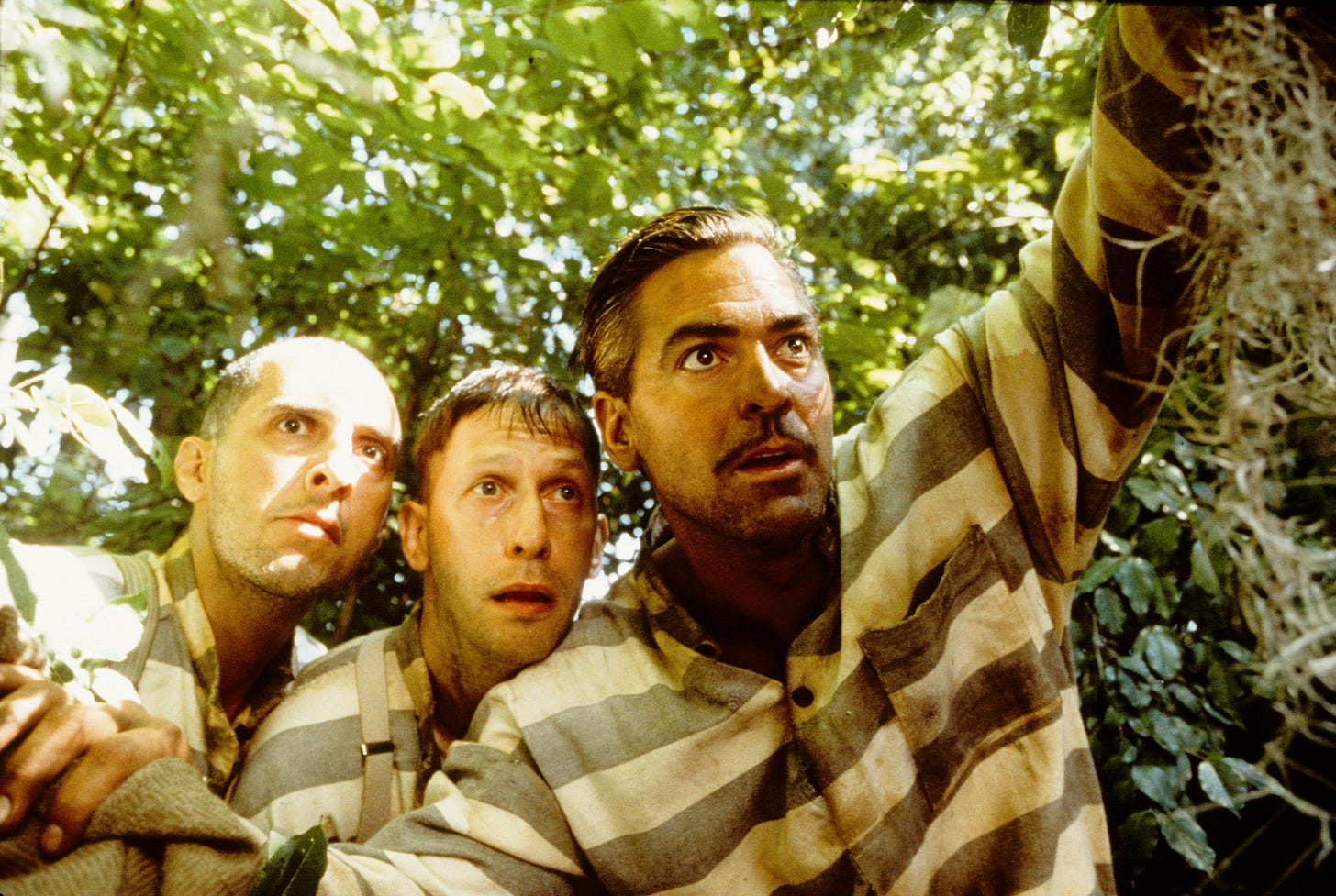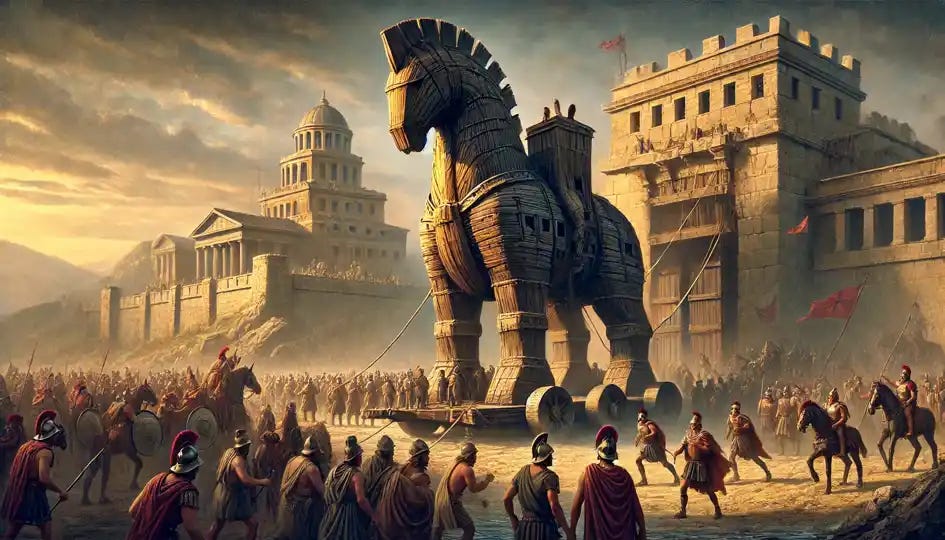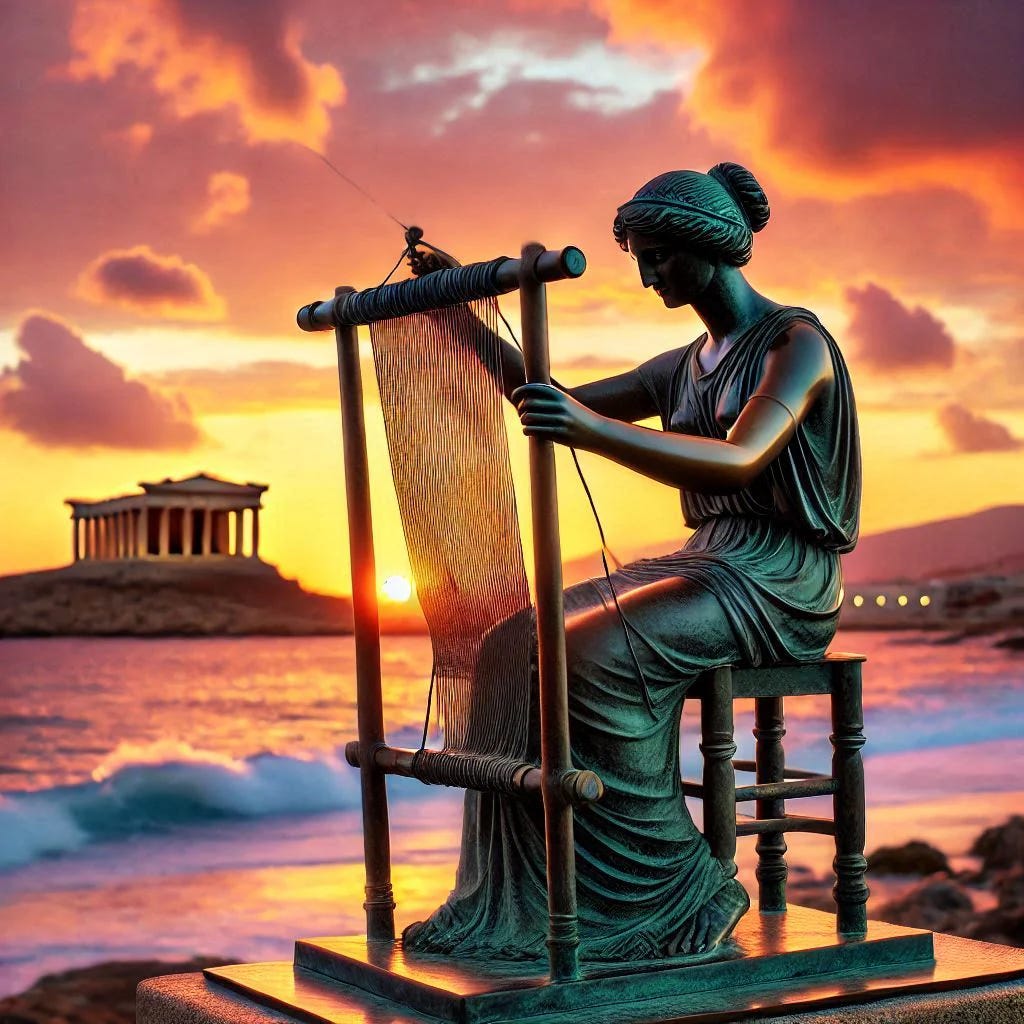Homer's Odyssey: The Most Important Story In Western Civilization Literature
And not just because Odysseus is one of the only intelligent heroes
And though they tell you I am lost
And their words report my death is come
The Fates have left me breathing still
Very much aliveAnd though my mind is cut by battles
Fought so long ago
I return victorious
I am coming homeAnd if the paths that I have followed
Have tread against the flow
There is no need for sorrow
I am coming home
-the Cruxshadows
Many classicists have clicked through this link to immediately begin castigating me without reading the article; that’s fine, the comment section is below. I welcome all Shakespeare fanboys or anyone who wants to advocate for Beowulf, or Ivanhoe, or Roland, or even Le Morte d'Arthur. And yes, I will deliberately draw the line: I am excluding the Bible, I will grant you it is more influential.
Homer’s Odyssey - even more so than the Illiad - stands as a cornerstone of Western civilization, not merely for its historical precedent but for its profound impact on literature, philosophy, and the collective cultural consciousness.
If by some happenstance you are unfamiliar with this work, I urge you to read it in one of the preferred translations; most of the cinematic productions omit too much, but still, better than nothing. For those who haven’t had the pleasure, a brief summary:
As our story opens, a full decade has elapsed since the sacking of Troy, and the legendary Greek hero-king, Odysseus, has yet to return to his realm in Ithaca. His palace has been overrun by a boisterous assembly of suitors, who, with impunity, have squandered his resources while vying for the affection of his steadfast wife, Penelope. She remains loyal to Odysseus, holding steadfast against their advances. Prince Telemachus, the only son of Odysseus, yearns to expel these interlopers but lacks the fortitude and experience to challenge their occupation. Among them, Antinous harbors a sinister plot to murder the prince, thereby eradicating the sole impediment to their sovereignty over the palace.
Unbeknownst to these usurpers, Odysseus still draws breath. He is ensnared on the island of Ogygia by the enchanting nymph Calypso, who is consumed by her love for him, preventing his departure. His heart aches for reunion with Penelope and Telemachus, yet he lacks the means to escape. On Mount Olympus, the deities deliberate over his fate, with Athena, his most fervent divine advocate, deciding to aid Telemachus. Disguised as an ally of his grandfather Laertes, she persuades the prince to convene the assembly where he denounces the suitors. Athena also prepares him for a voyage to Pylos and Sparta to consult with Nestor and Menelaus, comrades of Odysseus from the war, who confirm his survival and entrapment. As Telemachus plans his return, the suitors in Ithaca lay an ambush to assassinate him upon his arrival.
On Olympus, Zeus commands Hermes to liberate Odysseus from Calypso's grasp. Hermes convinces the nymph to release Odysseus, who subsequently constructs a vessel for his escape. However, upon setting sail, Poseidon, the sea god, enraged by Odysseus's earlier blinding of his son Polyphemus, unleashes a tempest to destroy his ship. Athena intervenes, saving Odysseus, who washes ashore in Scheria, the land of the Phaeacians. Here, Princess Nausicaa guides him to the royal court where he is warmly received. Upon revealing his identity, the Phaeacians, intrigued by his tales, pledge to transport him back to Ithaca, but not before they implore him to recount his odyssey.
Odysseus narrates his encounters with the Lotus Eaters, his confrontation with the Cyclops Polyphemus, his dalliance with the sorceress Circe, his near-seduction by the Sirens (and clever binding-himself-to-the-mast tactic of which you may have heard), his descent into Hades to seek Tiresias's wisdom, and his battle against the monster Scylla. Once he concludes his saga, the Phaeacians escort him home. In Ithaca, Odysseus, disguised by Athena as a beggar, finds refuge with Eumaeus, his loyal swineherd; there is also a moment where Odysseus’s ancient dog Argos recognizes his old master despite even Athena’s disguise. He soon reunites with Telemachus, disclosing his true self, and together they scheme to eradicate the suitors.
Returning to the palace in beggar's guise, Odysseus endures mockery from the suitors, unrecognized by all save for his nurse, Eurycleia, who keeps his secret. Penelope, with her own cunning, arranges an archery contest, promising marriage to whoever can string Odysseus's bow and shoot an arrow through a series of axes—a challenge only Odysseus could master. As each suitor fails, Odysseus, still in disguise, effortlessly succeeds, then unleashes his vengeance upon the suitors, with Telemachus and loyal servants by his side.
With the suitors vanquished, Odysseus reveals himself to the household and is joyously reunited with Penelope. (There’s even a clever scene where the unique nature of Odysseus’s bed serves to help confirm his identity in the verbal wordplay between husband and wife.) He then ventures to visit his father, Laertes, only to face an assault by the aggrieved kin of the slain suitors. Laertes, revitalized by his son’s return, quells the attack. Zeus, desiring peace, sends Athena to intervene, thus concluding Odysseus's long and arduous journey back to his throne and family.
The aforementioned narration of those encounters with the various encounters and challenges that waylaid Odysseus for a decade are mentioned only briefly above, but as one might surmise, they are indeed formidable to comprise such considerable threat and delay to a hero such as Odysseus. For he is an exemplar not just of martial skill and valor, capable of prowess at wrestling and skilled at archery, but his sharpest tool is his mind; he is persuasive and charming, cunning and more than a little duplicitous, and rather more a charming rogue than the other heroes of the Illiad - at least as likely to think his way out of a situation, whereas when Achilles, Ajax, or Hercules are given the choice they clearly prefer valor and battle and only reluctantly solve problems other ways. (The Labors of Hercules illustrate this well, with the occasional amusing exception to this rule.)
As noted, The Odyssey is one of the earliest works of Western literature, and the style in which it is told thematically sets the stage for narrative techniques, thematic complexity, and character development that would influence countless works thereafter. Its structure, with its episodic adventures leading to a cohesive narrative, has inspired the novel form, and its use of the epic simile and the extended metaphor has been studied and emulated for millennia. Any television miniseries, serialized novel, or episodic story that you’ve encountered owes a debt to this style of authorship.
Homer's characters, particularly Odysseus, embody archetypes that resonate universally. Odysseus is the quintessential hero whose journey, both physical and psychological, encapsulates the human condition—resourcefulness, cunning, endurance, and the yearning for home. These archetypes have shaped not only literary characters but also philosophical inquiries into human nature, ethics, and the dynamics of leadership and identity. While the characters of the Trojan War are more focused on their battlefield prowess - and even then, startlingly, ensemble-cast member demigod Hercules is a somewhat incidental side character compared to the main actors of the Illiad - Odysseus has motivation beyond hubris, vainglory, and bloodlust.
Also, more than other Greek heroes, Odysseus exhibits some awareness of moral philosophy and cultural awareness - albeit not the morality of our modern age. The Odyssey provides a rich tapestry of themes—hospitality (xenia), the consequences of hubris, the role of fate versus free will, and the complexities of human relationships. These themes are not only central to Greek culture but have transcended to become foundational in Western ethical thought. The epic questions the nature of justice, the value of loyalty, the nature of honor, and the struggle between personal desires and societal obligations.
One should not overlook how influential this narrative has been on the world’s literature in the millenia to follow; the Odyssey has permeated through the arts, from classical Greek drama to modern novels, films, operas - even comics, science-fiction and anime! Homer's work influenced philosophers like Plato, who discusses the moral implications of storytelling in The Republic, and Aristotle, whose Poetics partly derives from his analysis of epic poetry like the Odyssey. The journey of Odysseus has been a metaphor for life's journey in the works of Dante, Joyce, and numerous others. It has been reimagined countless times, in alternate styles whether in relatively similar tellings of the story or in more eccentric tellings like Great Depression rural Mississippi O Brother Where Art Thou or American Civil War Cold Mountain or 31st century anime-in-space Ulysses 31.
Some readers may consider this of lesser import, but one of the things that has kept this text in center view in the Western Civilization curriculum is its use scholastically, though I will be the first to grant you this is something of a recursive definition or if you prefer, a self-fulfilling prophecy. For centuries, the Odyssey has been a staple in education, teaching not only language and literature but also history, geography, and the ethics of ancient civilizations. Its study has been crucial in understanding the roots of Western thought, providing a lens through which to view the evolution of society, governance, and human rights.
It is no exaggeration that the Odyssey has played a pivotal role in shaping Greek, and by extension European, cultural identity. It encapsulates myths and legends that are not just stories but are part of the cultural DNA of Greece, influencing political rhetoric, national identity, and the perception of the self in relation to the community.
Despite its ancient origins, the Odyssey is still fundamentally a story about human interactions and thus remains relevant, offering new insights with each generation. Its themes of homecoming, identity, and the search for meaning amidst chaos are timeless, allowing it to resonate with contemporary audiences in diverse cultural contexts.
And though the story has other important characters, the primary central character is of course Odysseus, who exemplifies the archetype of the intelligent hero through a multifaceted display of cunning, wisdom, and strategic foresight. Even before the Odyssey begins, he is famous: he is the man who devised the Trojan Horse, the famous ruse that led to the fall of Troy. By hiding Greek warriors within a giant wooden horse presented as a peace offering, Odysseus not only secured victory but did so through a method that was almost entirely based on his cleverness, bypassing brute force for strategic subterfuge.
Throughout his journey, Odysseus shows remarkable adaptability. His encounter with the Cyclops Polyphemus illustrates this well. Knowing direct confrontation would be fatal, Odysseus uses his wit to craft an escape plan. He blinds Polyphemus with a wooden stake, cleverly identifying himself as "Nobody" so that when Polyphemus cries for help, his fellow Cyclopes think he's unharmed. This not only ensures their escape but does so by leveraging the limitations of Polyphemus's understanding and social context; perhaps more than anything else, Odysseus has a knack for outwitting and deceiving his foes to gain a tactical advantage.
Odysseus's intelligence also manifests in his long-term strategic thinking. His decision to not immediately reveal his identity to Penelope upon returning to Ithaca is a calculated move to assess the loyalty of those around him and to deal with the suitors decisively. By blending in as a beggar, he gathers crucial information while maintaining the element of surprise. (One notes, however, that his loyal dog Argos sees through even this Athena-granted disguise. The original good boy.)
Unlike most, Odysseus often reflects on his actions, learning from his mistakes. His encounter with the Sirens, where he orders his men to tie him to the mast but block their own ears, shows foresight and a deep understanding of human nature's susceptibility to temptation. This ability to balance curiosity with caution is a hallmark of his prudence and wisdom.
Odysseus is noted for his persuasiveness and his eloquence is not merely rhetorical; it serves as a tool for survival. When dealing with figures like Circe or the Phaeacians, Odysseus uses persuasive speech to secure aid or safe passage. His storytelling during his stay with the Phaeacians, where he recounts his adventures, is a strategic narrative meant to garner sympathy and support, showcasing his understanding of narrative power in diplomacy.
Odysseus's travels across various lands necessitate a broad cultural knowledge, which he leverages to navigate safely. His knowledge of customs and deities allows him to adapt his behavior and offerings to appease or outwit local gods or rulers, demonstrating a profound intellectual engagement with the world around him.
And of course, once Odysseus has returned to Ithaca, he (still disguised) proposes the contest of stringing his bow — an act meant only for him, symbolizing his unique right to rule and protect his home. Penelope, in her wisdom, uses this contest as the final test for her suitors, not knowing it would lead to her husband's revelation. This serves both as as a literal test of strength and demonstration of cleverness on the part of Odysseus. She also tests him with a clever ploy about the nature of their marital bed (constructed into a tree) - these various ploys show us that Odysseus values his wife for her intellect as well and undoubtedly credit why Telemachus is a bright young lad as well.
In summary, Odysseus's intelligence is not merely a trait but a dynamic force that shapes his odyssey. His intellectual acumen allows him to overcome seemingly insurmountable odds through strategies that are as cerebral as they are creative, making him not just a hero of physical might but one of profound mental agility. His journey is as much an intellectual odyssey as it is a physical one, reflecting the ancient Greek valorization of the mind alongside the body.
In summary, the Odyssey is not just a historical artifact but a living text that has shaped the intellectual, moral, and artistic landscape of Western civilization. Its importance lies in its ability to speak to the human experience across millennia, making it not only a foundational text but a continual source of inspiration and introspection, and not just as an archetype of the hero’s journey but as a valorous and capable hero who achieves victory by cleverness and quick wit at least as often as sheer force of arms.






Do you recommend any translations?